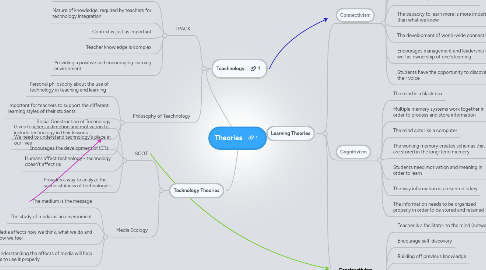
1. Technology Theories
1.1. SCOT
1.1.1. Social Construction of Technology
1.1.2. We need to understand technology's place in our lives
1.1.3. Humans affect technology - technology doesn't affect us
1.1.4. Provides a way to analyze the successfulness of technologies
1.2. Media Ecology
1.2.1. The medium is the message
1.2.2. The study of media as an environment
1.2.3. Media affects how we think, what we do and how we feel
1.2.4. Understanding the effects of media will help us to use it properly
2. Teachnology
2.1. TPACK
2.1.1. Relationship between Technology, Pedagogy and Content
2.1.2. Nature of knowledge required by teachers for technology integration
2.1.3. Context is just as important
2.1.4. Teacher knowledge is complex
2.1.5. Providing a positive and encouraging learning environment
2.2. Philosophy of Teachnology
2.2.1. Personal philosophy about the use of technology in teaching and learning
2.2.2. Important for teachers to support the different learning styles of their students
2.2.3. Gives teachers a direction and motivation to include technology in their lessons
2.2.4. Encourages the development of ICTs
3. Learning Theories
3.1. Connectivism
3.1.1. Building connections through networking
3.1.2. Learning theory for the digital age
3.1.3. Knowledge is developed through sharing
3.1.4. Non-human appliances can also learn
3.1.5. The capacity to learn more is more important than what we know
3.1.6. The development of world-wide connections
3.1.7. Encourages management and leadership as well as ownership of one's learning
3.1.8. Students have the opportunity to discover their voice
3.2. Cognitivism
3.2.1. The mind is a black box
3.2.2. Multiple memory systems work together in order to process and store information
3.2.3. The mind acts like a computer
3.2.4. The working memory creates schemas that are stored in the long-term memory
3.2.5. Students need motivation and meaning in order to learn
3.2.6. The way information is presented is key
3.2.7. The information needs to be organized properly in order to be stored and retained
3.3. Constructivism
3.3.1. Teacher is a facilitator to the mind (network)
3.3.2. Encourage self-discovery
3.3.3. Building off previous knowledge
3.3.4. Promotes positive learning, stimulation, engagement, thinking and understanding
3.3.5. Exploration and sharing of ideas and knowledge
3.3.6. Learning is active
